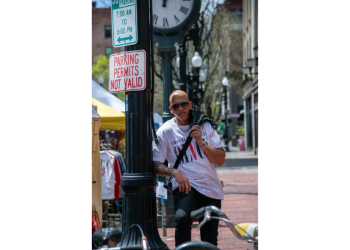Epshteyn, who remains close to Trump, called in to his Maricopa County Superior Court proceeding by phone. It was the first time he has appeared in open court for his alleged role in helping to assemble the elector strategy in seven states that Biden had won.
Two other co-defendants in the case brought by Arizona Attorney General Kris Mayes (D) also appeared by video to plead not guilty to the same counts that Epshteyn faces, including conspiracy, fraud and forgery: Jim Lamon, a 2020 GOP elector from Arizona who signed paperwork purporting Trump had won the state, and Jenna Ellis, an attorney who presented baseless claims of widespread malfeasance in states lost by Trump and is accused of circulating the elector theory.
Tuesday’s proceedings inside the crowded basement of a court building mark the final round of not-guilty pleas in Arizona’s elector case. Eighteen Republicans from Arizona and beyond were indicted in late April. Prosecutors described Trump as an unindicted co-conspirator.
The case in Arizona follows charges by prosecutors in five other states tied to the 2020 elector strategy. The Arizona case is getting underway just as the state and nation prepare for a likely November rematch of Trump and Biden — with the current court calendar colliding with the election calendar.
Prosecutor Nicholas Klingerman declined to speak specifically about potential plea offers but indicated that some could be forthcoming.
“We anticipate, I think, like with any other case, that we will make plea offers,” he said. “We have not made any yet. … But I have discussed the possibility with some defense counsel.”
Klingerman said prosecutors’ investigation is ongoing, and he was unsure if they would seek additional charges. He declined to detail the nature of the continuing probe.
The state’s team of investigators and prosecutors assembled about a year and a half ago to examine efforts to undo or undermine Trump’s 10,457-vote loss in the state. The probe began after Mayes won her election in 2022, partly on a promise to investigate the elector strategy in a state where conspiracies and skepticism about elections and government have flourished over the past four years. The state’s previous attorney general, Mark Brnovich (R), did not pursue a criminal case.
One key area that state investigators have obtained evidence about and remain interested in: the pressure placed on local officials by the president’s key allies to either delay Trump’s loss or prevent it from happening altogether, according to two people familiar with the probe who spoke on the condition of anonymity because of the sensitivity of the matter.
In the critical time frame after Trump’s loss, Epshteyn was in touch with figures central to the elector strategy outside Arizona — and within, according to publicly released records. In emails after Trump’s loss, Epshteyn wondered whether templates of pro-Trump elector ballots could be made for states that Trump lost, including Arizona. Epshteyn’s work to try to undo Trump’s loss extended into 2022, when then-Arizona Speaker of the House Rusty Bowers (R) said that he spoke with Epshteyn, who unsuccessfully sought support for legislation that would have reversed Biden’s win.
In the weeks after Trump’s defeat, Ellis joined then-Trump attorney Rudy Giuliani in presenting baseless claims of widespread malfeasance in states lost by Trump. She accompanied Giuliani for a meeting in downtown Phoenix, where unfounded claims of election fraud were circulated, and was by his side for a meeting with Bowers and other state lawmakers, where they were pressed to help overturn the election results. Ellis also circulated a theory that the 2020 election results could be overturned, centering on the counting of electoral votes on Jan. 6, 2021. Giuliani was also charged in Arizona and has pleaded not guilty.
Presidential electors are empowered by the Constitution to determine the outcome of presidential elections. Usually, only electors of each state’s winning candidate meet in mid-December to cast votes for that candidate after electoral results have been certified at the state level. But in 2020, despite Trump’s loss, Republican electors gathered to declare him the winner of their states.
Some of those involved in the strategy in Arizona have said either that the rosters of GOP electors were to be used only if Biden’s win was contested in Congress on Jan. 6, 2021, or that they were simply acting as loyal conservatives and doing what attorneys, GOP party bosses and Trump allies asked of them.
























